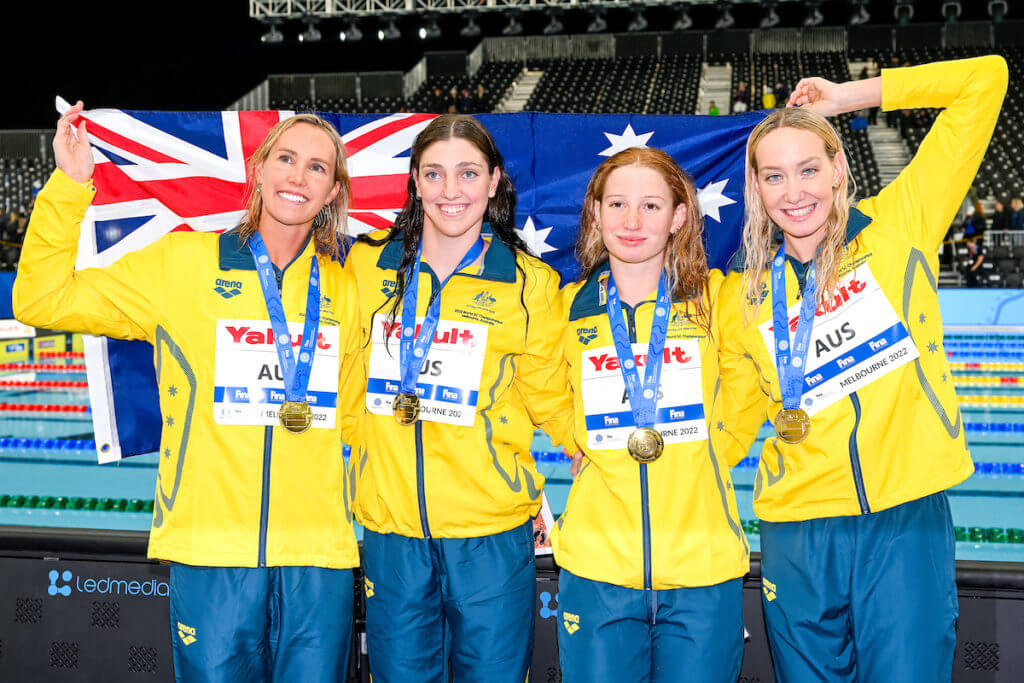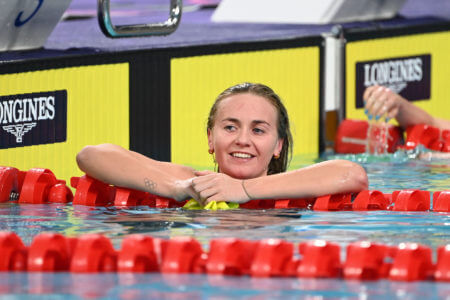Australian Women Set to Show Off Freestyle Talent and Depth Again in 2023

Australian Women Set to Show Off Freestyle Talent and Depth Again in 2023
Last week’s Australian Championships were hardly more than a tune-up, a glorified exhibition. Sure, national titles are plenty meaningful, but without selection for any major meets on the line, most of the country’s top performers had little need to disrupt their training, especially with the country’s World Championships selection trials just two months later and the World Championships in Fukuoka just one month after that.
But even without needing to swim their best, the Aussie women issued stern reminders of their abilities in the freestyle events: depth and speed currently unmatched among the rest of the world, and that’s why they will undoubtedly be favored once again to win world titles in the 400 and 800 free relays in July.
This Australian women’s 400 free relay group has one loss in a decade — and it was a narrow defeat at the 2017 World Championships, with the group finishing 0.29 behind the victorious Americans. Before that, the Aussies had finished a mere 0.12 behind the U.S. in 2013 at Worlds. Otherwise, going back to 2012, Australia has won three Olympic gold medals, three world titles, three Commonwealth Games gold medals and two Pan Pacific Championships triumphs. Of those 11 wins, Cate Campbell has been part of nine (all except last year’s world title and Commonwealth Games win), followed by Emma McKeon’s eight golden relays and Bronte Campbell’s seven.
Last year, reigning 100 free Olympic champion McKeon skipped the World Championships, and Australia still defeated runnerup Canada by 1.20 seconds in this relay. That team was led by two swimmers who were not part of the finals quartet from the Olympics one year earlier: Mollie O’Callaghan and Shayna Jack, with Meg Harris and Madison Wilson joining them. In the early going of 2023, O’Callaghan (52.63) and Jack (52.64) have the two quickest times in the world in the 100 free with their times from the Australian Championships, with McKeon (53.22), Harris (53.46), Wilson (53.78) and Cate Campbell (53.78) not far behind.
Add up those top four times, and the resulting composite relay is 3:31.95, two tenths quicker than Canada’s silver-medal time from Budapest last year. And yes, that’s without any of the swimmers performing close to their best and without relay exchanges. Beating the Aussies in this event is a pipe dream.

Ariarne Titmus is a key member of Australia’s 800 free relay — Photo Courtesy: Delly Carr
The situation has been far different in the 800 free relay, where Australia has entered the 2021 Olympics and 2022 World Championships as favorites but failed to win gold on either occasion. But at the Commonwealth Games last year, the team of Wilson, Kiah Melverton, O’Callaghan and Ariarne Titmus crushed the world record, their time of 7:39.29 beating the Americans’ world-title-winning mark by over two seconds.
Once again, the first top swims of 2023 only augment Australia’s favorite status. At last week’s championships, O’Callaghan edged out Titmus, the Olympic champion and second-fastest performer ever, with a blistering finishing split. O’Callaghan touched in 1:55.15, and Titmus took second in 1:55.28. Third and fourth, however, were swimmers hardly known for their 200 free speed.
Jack swam a time of 1:55.37, clobbering her previous best of 1:57.29. Same story for Kaylee McKeown, the double Olympic backstroke gold medalist, who dropped from 1:58.21 to 1:56.88.
Combine those times with the best marks of Titmus (1:53.09), O’Callaghan (1:54.01), Wilson (1:55.86) and Melverton (1:55.94), and you get the idea of the sort of special swim Australia could be capable of this year. Make no mistake: the Americans will have a chance at another upset with Katie Ledecky likely to be joined by an improving teenage group (Bella Sims, Erin Gemmell, Claire Weinstein and Katie Grimes are among the possibilities), and you can’t count out a Canadian team led by Summer McIntosh. But the talent level dictates that this is an Australian race to lose.
It’s early in the long course season with plenty of major developments to come, but the Australian women have opened the year in the same position as they finished 2022: freestyle favorites.



